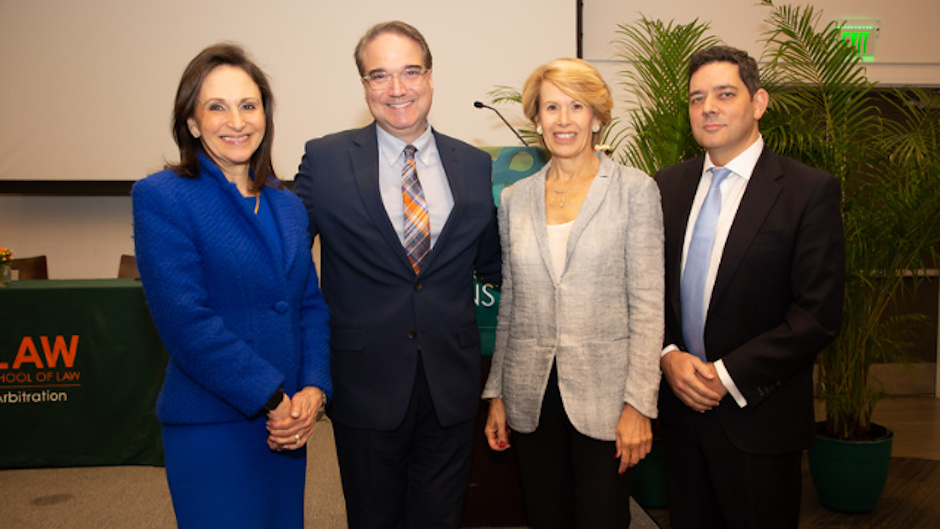Miami Law’s International Arbitration Institute, in collaboration with the Miami Law International Moot Court Board, hosted its sixth annual White & Case International Arbitration Lecture featuring guest speaker Gabrielle Kaufmann-Kohler, the current president of the International Council for Commercial Arbitration (ICCA), who discussed the rise of International Arbitration throughout the last century and provided an analysis on the methods for reform being discussed in the field today.
Dean Anthony E. Varona gave opening remarks, introducing distinguished Miami Law alumna Carolyn Lamm, J.D. ’73, a partner and litigator at White & Case LLP in Washington, D.C., who also serves as the Distinguished Faculty Chair of Miami Law’s White & Case International Arbitration LL.M. Program and teaches a course on “Investment Arbitration” in the program.
Lamm, in turn, introduced Kaufmann-Kohler, a partner of Lévy Kaufmann-Kohler and professor emerita at Geneva University Law School, who also has been recognized as one of the most influential arbitrators in the world. Among those in attendance were Miami Law faculty members and students with a keen interest in international arbitration as well as members of Miami’s ever-growing legal community specializing in international disputes.
During her lecture, Kaufmann-Kohler detailed the origins of International Arbitration and its rise throughout the twentieth century, the opening of emerging economies, and the gradual shift in economic and political power on the world scene. A rapidly globalized economy led to unprecedented demand for International Arbitration, bringing numerous challenges to both arbitrators and practitioners. Among them, Kaufmann-Kohler discussed the increased cost and duration of proceedings, issues with transparency, and the legitimacy of arbitral tribunals. Addressing these concerns, she pointed out that there are now many “more democratic states today than there were a few decades ago” and that “one of the highlights of International Arbitration is depoliticization.”
Finally, Kaufmann-Kohler discussed several possible reforms and remedies that have been proposed in the field, including abolishing International Arbitration altogether, which she believed would undermine protections of foreign investment and was thus likely implausible. Other options discussed included maintaining the status quo, making improvements to the existing arbitration system, or more radically making structural changes to the system, such as introducing an appeal mechanism or a multilateral investment court.
Questions from students in the White & Case International Arbitration LL.M. Program and practitioners who attended the lecture followed. Jonathan C. Hamilton, a Washington, D.C. partner and head of White & Case’s Latin American Arbitration department, who serves as Distinguished Faculty Chair of Miami Law’s International Arbitration Institute, offered concluding remarks before attendees retired to a cocktail reception on the university Shalala Center’s lake-view terrace.

